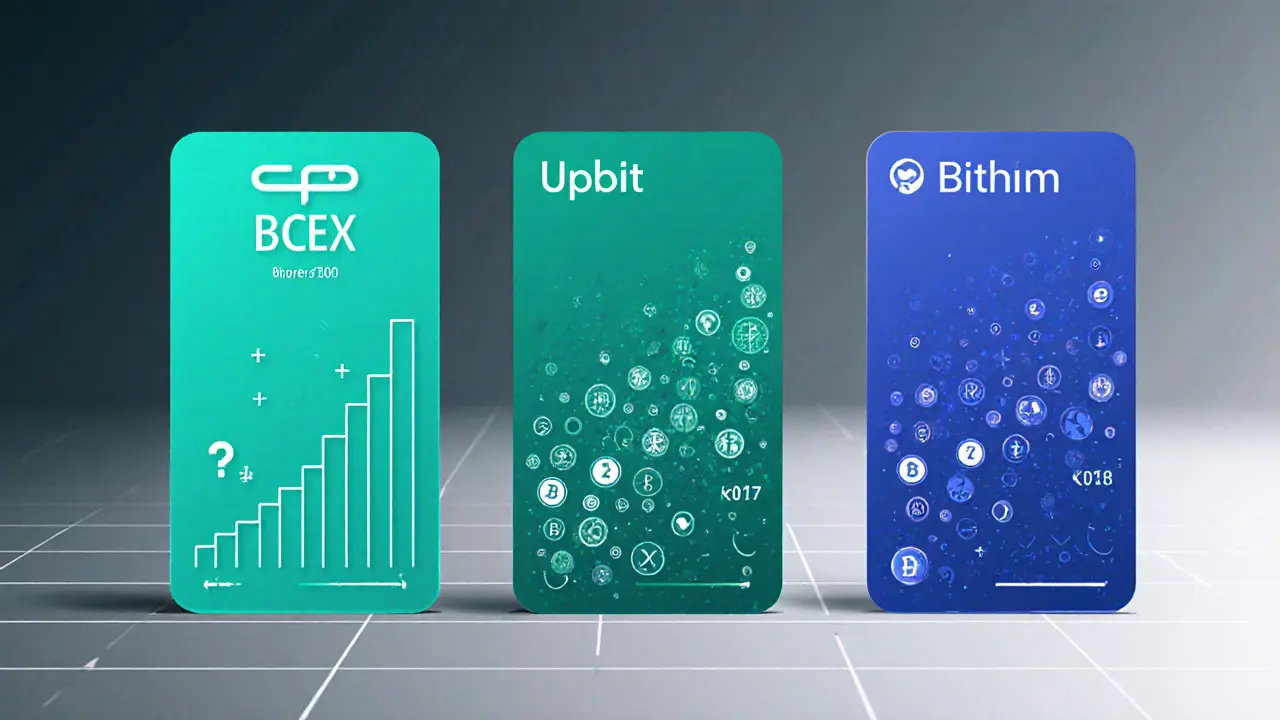BCEX vs Korean Exchanges Comparison Tool
Active Trading Pairs: 7
Daily Volume: ~$3M (CoinGecko)
Fee Range: 0.2% - 0.8%
Regulation: Unclear (Malta/HK/KR)
US Access: Blocked
Active Trading Pairs: ~300
Daily Volume: ~$1.2B
Fee Range: 0.08% - 0.25%
Regulation: South Korean fintech license
US Access: Blocked
Active Trading Pairs: ~250
Daily Volume: ~$800M
Fee Range: 0.15% - 0.5%
Regulation: South Korean fintech license
US Access: Blocked
Key Insights
- Trading Pairs: BCEX has significantly fewer assets available compared to Upbit (~300) and Bithumb (~250).
- Volume: BCEX reports $12B daily volume but CoinGecko shows only ~$3M, while Upbit and Bithumb show much higher volumes.
- Fees: BCEX's fees are competitive but not lowest; Upbit offers the most competitive rates.
- Regulation: BCEX lacks clarity on its licensing, whereas Upbit and Bithumb have South Korean fintech licenses.
Recommendation
Based on this comparison, BCEX offers lower fees but suffers from limited asset availability, unclear regulation, and inflated trading volume claims. Established Korean exchanges like Upbit and Bithumb provide better liquidity, more trading pairs, and clearer regulatory compliance.
Note: This tool is for educational purposes only. Always do your own research before making investment decisions.
Quick Take
- BCEX claims 10million users and $12billion daily volume, but tracking sites show about $3million.
- Only 7 crypto pairs are actively listed despite marketing of 500+ assets.
- Headquarters are unclear - the exchange cites Malta, HongKong and a Korean office.
- Fees sit between 0.2%‑0.8%, comparable to other Korean platforms.
- U.S. residents are blocked; Korean users must link a single local bank.
What is BCEX?
When you hear the name BCEX is a cryptocurrency exchange launched in 2017 that offers spot, margin and futures trading, you probably picture a massive global platform. The company’s own pages promise access to more than 500 digital assets and a daily trading volume that rivals the world’s biggest exchanges.
How BCEX Positions Itself
The exchange markets itself as a low‑fee, high‑liquidity venue for both beginners and seasoned traders. Its fee schedule ranges from 0.2% for maker orders up to 0.8% for taker orders, which aligns with the typical Korean market range. BCEX also advertises three core products:
- Spot trading - buy and sell crypto instantly.
- Margin trading - leverage up to 5× on select pairs.
- Futures trading - perpetual contracts with up to 20× leverage.
In addition, BCEX claims to operate a decentralized exchange (DEX) under the same brand, though the DEX is less visible on their main site.
Reported Numbers vs Independent Data
BCEX’s marketing material lists a 24‑hour trading volume of roughly $12billion and over 10million registered users worldwide. Independent aggregators paint a different picture. CoinGecko reports a daily volume between $2.85million and $3.0million and only seven active trading pairs. The discrepancy raises two red flags:
- Volume inflation - inflated figures can mislead traders about market depth and price slippage.
- Asset availability - the exchange advertises 500+ assets, yet only seven cryptocurrencies (BTC, ETH, BNB, USDT, KRW‑PEgged stablecoin, and two minor altcoins) are currently tradable.
These gaps suggest either delayed data updates on tracking sites or a reality where BCEX’s actual offerings are far smaller than promised.

Regulatory and Jurisdiction Ambiguities
The exchange’s headquarters information swings between Malta, HongKong and a claimed Korean office. Each location carries different regulatory expectations:
- Malta - known for a relatively clear crypto licensing regime.
- HongKong - currently drafting stricter anti‑money‑laundering rules for digital assets.
- South Korea - permits crypto trading but requires exchanges to partner with a domestic bank and comply with stringent AML/KYC requirements.
Because BCEX blocks U.S. investors, it appears to avoid the SEC’s jurisdiction, but the lack of a clear licensing statement makes compliance verification difficult for Korean users and others.
How BCEX Stacks Up Against Other Korean Exchanges
| Feature | BCEX | Upbit | Bithumb |
|---|---|---|---|
| Active trading pairs | 7 | ~300 | ~250 |
| Daily volume (reported) | $3M (CoinGecko) | $1.2B | $800M |
| Fee range (maker/taker) | 0.2%‑0.8% | 0.08%‑0.25% | 0.15%‑0.5% |
| Regulatory license | Unclear (Malta/HK/KR claim) | South Korean fintech license | South Korean fintech license |
| US access | Blocked | Blocked | Blocked |
While BCEX’s fees are competitive, the sheer shortage of listed assets and the ambiguity around licensing make the platform a riskier choice compared to established Korean players.
Red Flags and Due‑Diligence Checklist
If you’re considering BCEX, run through this quick checklist before depositing any funds:
- Verify the exchange’s legal registration - request a copy of the operating license from the claimed jurisdiction.
- Cross‑check trading volume on multiple aggregators (CoinGecko, CoinMarketCap, CryptoCompare).
- Confirm the exact list of supported cryptocurrencies - avoid assuming the “500+” claim is accurate.
- Test the withdrawal process with a small amount to ensure funds move promptly.
- Read recent user reviews on forums like Reddit and Bitcointalk; look for recurring complaints about slippage or account freezes.
- Check whether the exchange complies with Korean bank integration standards, especially if you intend to use KRW deposits.
Being thorough now can save you from headaches later.
Frequently Asked Questions
Is BCEX a legitimate exchange?
BCEX appears on reputable trackers like CoinGecko, which suggests a baseline level of legitimacy. However, the unclear headquarters and large gaps between claimed and actual trading volume mean you should treat it as a higher‑risk platform until more transparent licensing information is provided.
How many cryptocurrencies can I trade on BCEX?
Officially the exchange lists over 500 assets, but at the time of writing only seven pairs are actively tradable. Always check the “Markets” tab on the platform for the current lineup.
What are the fees for spot trading on BCEX?
Spot trading fees range from 0.2% for maker orders to 0.8% for taker orders, which is comparable to many Korean exchanges but higher than the cheapest tier offered by Upbit.
Can I use a Korean bank to deposit KRW?
Yes, BCEX partners with a single Korean bank for fiat deposits and withdrawals. This limitation can cause slower processing times compared to platforms that support multiple banks.
Why does BCEX block U.S. users?
The exchange chooses to avoid U.S. jurisdiction, likely due to the SEC’s strict stance on crypto trading platforms. Users from the United States should look for exchanges that are registered with a U.S. regulator.
Bottom Line
BCEX offers a clean interface and low fees, but the limited number of active markets, opaque jurisdiction and inflated promotional numbers make it a risky pick for most traders. If you prioritize transparency and deep liquidity, stick with well‑regulated Korean giants like Upbit or Bithumb. If you still want to test BCEX, start with a tiny amount, verify withdrawals, and keep a close eye on volume data from independent trackers.


Author
Ronan Caverly
I'm a blockchain analyst and market strategist bridging crypto and equities. I research protocols, decode tokenomics, and track exchange flows to spot risk and opportunity. I invest privately and advise fintech teams on go-to-market and compliance-aware growth. I also publish weekly insights to help retail and funds navigate digital asset cycles.